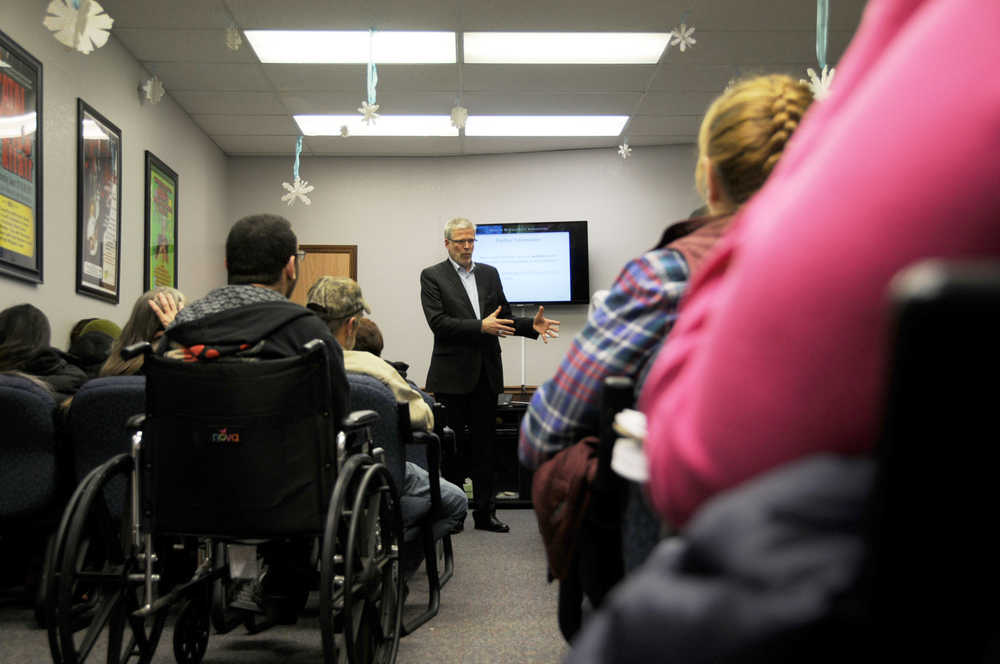The Alaska Department of Health and Social Services is weighing its options to reduce costs on the Medicaid program that provides home- and community-based services to seniors and those with disabilities.
The current program, known as the 1915 (c) program, allows seniors and those with qualifying disabilities to receive in-home care from personal care assistants. The program applies to those older than 65, those with physical and developmental disabilities, children with complex medical conditions and those with intellectual and developmental disorders.
The current program, which has been in place since 1993, is the third most expensive portion of the state’s Medicaid program, running up a total bill of about $168 million in 2015. The average annual cost per patient is about $85,000, according to Senior and Disability Services Division Director Duane Mays.
“As a director, when I look at that, when I look at the annual growth, I can’t seem to get my hands around it,” Mays said. “My responsibility as a director is to say, ‘Where is that happening?’ so when I dive into all those service components, I know where those increases are occurring.”
To stop rising costs, the department is considering several different models to draw more federal match dollars into the state to pay for the program. Mays and Lisa Shugarman of Health Management Associates, a health care consulting firm hired by the state, are touring communities to present the options and gather feedback.
At a meeting in Kenai on Tuesday night, Mays and Shugarman presented two plans the state is evaluating, which Mays said will cap the cost and keep the program “budget neutral.”
One plan, called Community First Choice, would be available to individuals who meet an “institutional level of care.” In Community First Choice, the federal government would match around $56 to every $50 of state funding, as opposed to the 50-50 match provided in a general Medicaid program, Shugarman said.
“The federal government is putting six percent more. It’s an advantage for the state. It’s bringing more resources into the state to serve the population.”
The same services would be covered, and the state would have to institute a council including stakeholder members — those receiving the services or those with family members receiving the services. Mays said this was an advantage because when the advisors are all providers, the patient voice may get lost.
“We all know that when the providers are in the room, while they may mean well, (they) tend to dominate the conversation,” Mays said.
The other option is called 1915 (i), named for the section of the Social Security Act that established it. The federal government would fund 50 percent of the project for general services, but the catch is that the populations served would have to be limited. The state would have to identify target populations who would qualify for the program.
Mays said the state had tentatively identified four target populations: Alzheimer’s disease and related dementia, those who do not qualify for a waiver under the other programs, traumatic brain injury and severe mental illness. The original waiver program would not entirely disappear, Mays said. Not all services could be transferred, but many would, and the 1915 (c) population would be reduced.
With evaluations from Health Management Associates, the department is aiming for approval by the national Center for Medicare and Medicaid Services and a “go-live” with a revised program by July 1, 2017.
The point is to “get fences around” the growth of the program, Mays said. When he took leadership of the division, the program cost approximately $100 million, he said. By next year, the program may top $200 million, doubling the cost in five years.
As a stopgap savings measure, the state reduced its draw from the Medicaid waiver waiting list earlier this year from 200 to 50. Several attendees asked for the reason, and Mays said it was both budgetary and staffing challenges after the legislature-imposed cost cuts. The registry may go back up eventually, but for now the department will continue to manage it, he said.
“Our house is on fire,” Mays said. “In an effort to get our house in order, to move forward, we proposed … to reduce our draw from 200 to 50. We’re going to work that registry to the best of our ability.”
Most of the attendees were concerned about loss of services. Changing the requirements and possibly extending services to more recipients might stretch services thin for those already on the waiver program, several commenters said.
The department is trying to address historical problems of fraud and abuse by personal care attendants and make the program more efficient. It has to either break even or possibly show cost savings, or the legislature will shoot it down, Mays said.
“We keep pushing it, asking for more, asking for more,” Mays said. “My sponsor statement to that is, ‘When is enough enough?’”
Reach Elizabeth Earl at elizabeth.earl@peninsulaclarion.com.

